|
Corinth
Hotels
Some Things
To do
General Information
Athens
Hotels
Some Things To Do
General Information
Corfu Island
Hotels
Some
Things To Do
General
Information
Crete Island
Hotels
Some Things To Do
General Information
Kefalonia Island
Hotels
Some Things to Do
General Information
Kos Island
Hotels
Some Things to Do
General Information
Mykonos Island
Hotels
General Information
Naxos Island
Hotels
General Information
Paros Island
Hotels
General Information
Rhodes Island
Hotels
Some Things To Do
General Information
Santorini Island
Hotels
General Information
Zakynthos Island
Hotels
Information coming soon
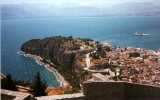
|
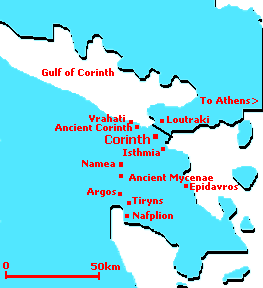 Corinth sits
on the Gulf of Corinth just west of the Corinth Canal that separates the
Peloponnese from the Greek mainland. The City of Athens is just over an
hours drive from Corinth. The Corinthia region offers many archeological
and historical sights, wonderful beaches, picturesque scenery, and
modern towns. Corinth sits
on the Gulf of Corinth just west of the Corinth Canal that separates the
Peloponnese from the Greek mainland. The City of Athens is just over an
hours drive from Corinth. The Corinthia region offers many archeological
and historical sights, wonderful beaches, picturesque scenery, and
modern towns.
The
Peloponnese is one of the most interesting and magical places of Greece. A
place with a great legacy, since it was the Center of civilization that
later spread on through the rest of Greece. TRANSPORTATION ~
Vrahati - is an extraordinary
Resort in the Corinthia area. It is situated in an ideal location
as a starting point for visiting many different archeological sights of
the Peloponnese. Vrahati gives you the opportunity to admire its natural
beauty, Greek hospitality, as well as to enjoy an exciting nightlife and
most of all the beautiful Beach. The unique Beach of Vrahati is known
for its deep blue waters, pebble and sandy beach with a picturesque tree lined
coastline.
|
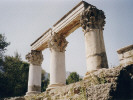
|
~
Ancient Corinth - is 7km from New Corinth. These ancient
remains of the city at the base of the Acrocorinth display evidence of
Greek, Roman and Byzantine History. Some of the main features of the
site are the partly reconstructed Temple of Apollo, the Fountain of
Glauke, Julian Basilica, Peirene Fountain and the Museum. The temple of
Aphrodite within the fortress at the top of Acrocorinth remains intact
to this day. |
| ~
Isthmia -
was the site of athletic contests, like the more well known Olympia.
Games were held every four years. A museum on the ancient site displays
finds from the Temple of Poseidon and the site of the Isthimian Games. |
| ~
Namea - Three columns remain
standing from the Temple of Namean Zeus at this ancient site. The
Ancient Stadium, Ancient Baths and Museum are worth the visit. |
|
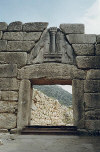
|
~
Ancient Mycenae - The primary remains at Mycenae are
walls and tombs. The palace itself has largely been destroyed. The
oldest archaeological findings from Mycenae are dated around 3000
BC. However, during 1900-1600 BC the hill was fortified with
walls. Around 1600 BC tombs were built reserved for distinguished
figures and approximately 1350 BC on the hill of Mycenae there
were built new colossal walls, preserved up to the present, which
surrounded among others a large number of Royal graves.
Mycenae archaeological site is associated with many myths.... |
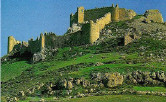 |
~
Argos - is said to be the first formed town in Greece as
well as Europe. Some of the Sights in the area consist of the
Archeological Museum, Ancient Argos (with what once was the
largest ancient Greek Theater and the remains of Ancient Roman Baths) and
the Fortress of Larissa (photograph left). |
|
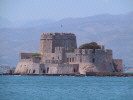
|
~
Nafplion - This historical town was originally two
hilltop fortresses until the Venetians built up the area in the
15th Century during their occupation. Traces of the Venetians presence
are clearly visible from the towns architecture. There are many
sights to see in the town such as the fortresses of Palamidi and
Acronafplia, Folk Art Museum, Military Museum, Archeological
Museum and not forgetting the towns picturesque pebble beach. |
|
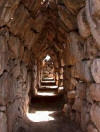
|
~
Tiryns - Legend connected the Bronze Age hero Hercules
with the site, while its fortifications, constructed of tremendous
stones, were attributed to the mythical giants, the one-eyed
Cyclopes. Tiryns, under the leadership of Odysseusí friend
Diomedes, sent a contingent of men and ships to help regain Helen
from the Trojans. |
|
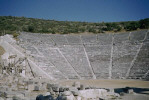
|
~
Epidavros - The Ancient Greek theater is the highlight of
Epidavros, its 34 rows of seats that can hold up to 6200
spectators, at a later period, 21 new rows of seats were added
increasing the capacity by 14000. In 1954 the theatre was
restored into its original shape and since then it hosts every
summer the productions of the Epidaurus festival. |
|


 Corinth sits
on the Gulf of Corinth just west of the Corinth Canal that separates the
Peloponnese from the Greek mainland. The City of Athens is just over an
hours drive from Corinth. The Corinthia region offers many archeological
and historical sights, wonderful beaches, picturesque scenery, and
modern towns.
Corinth sits
on the Gulf of Corinth just west of the Corinth Canal that separates the
Peloponnese from the Greek mainland. The City of Athens is just over an
hours drive from Corinth. The Corinthia region offers many archeological
and historical sights, wonderful beaches, picturesque scenery, and
modern towns.




